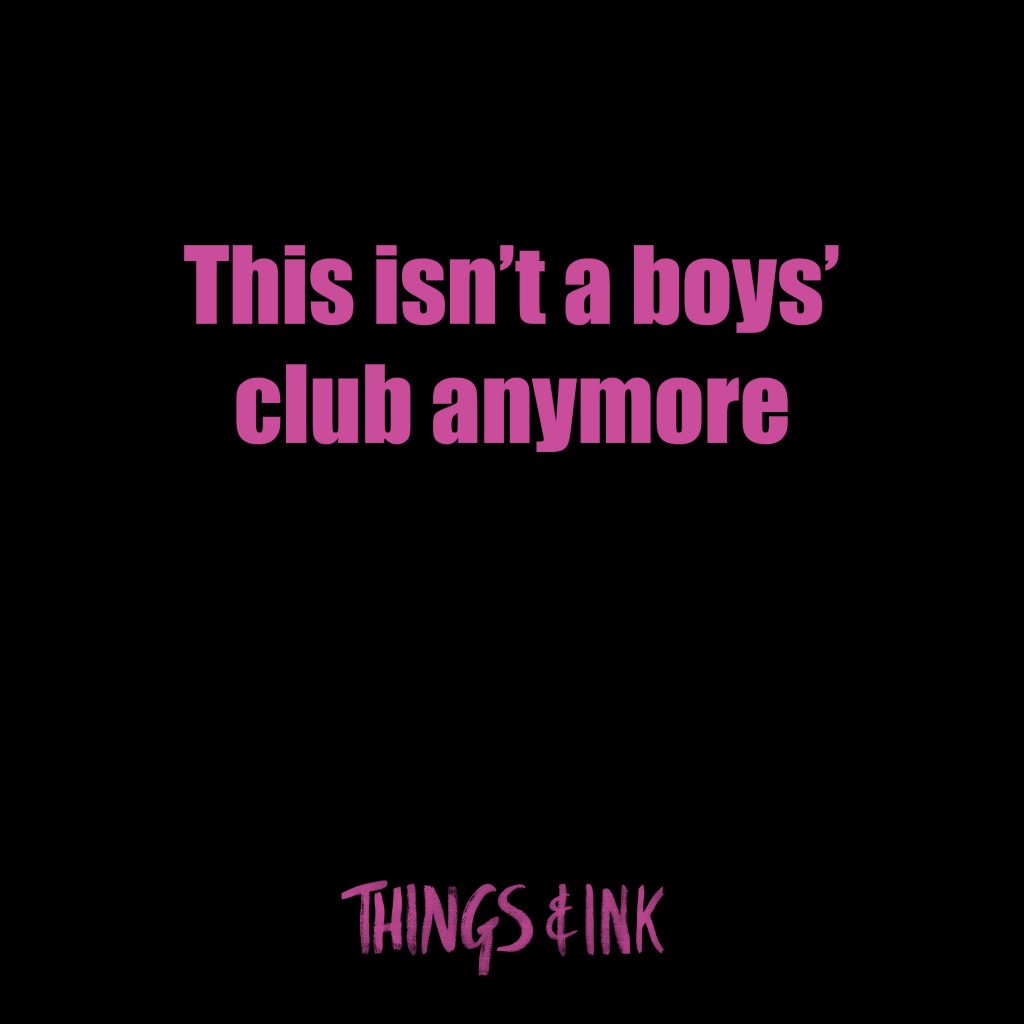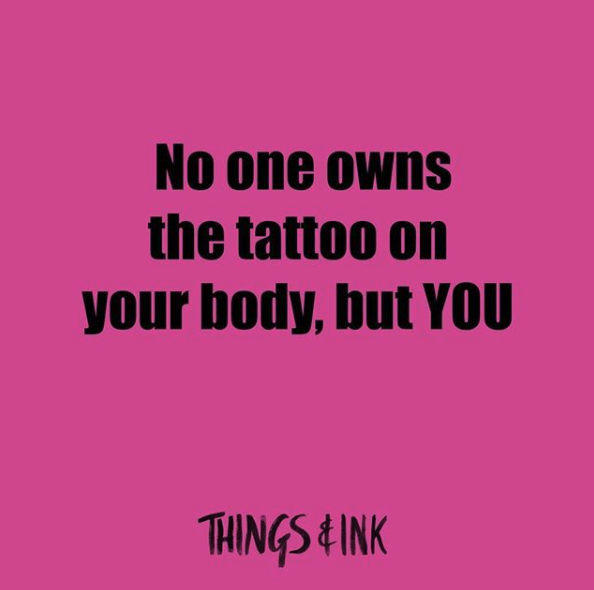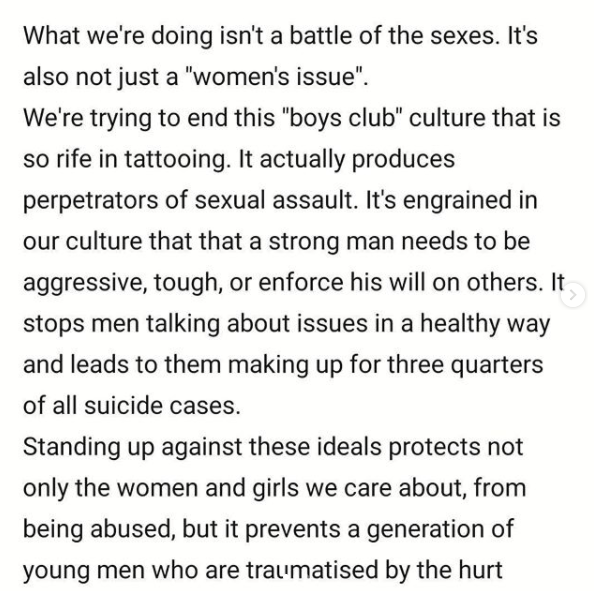Last weekend, we stood in support of the hundreds of brave women who took to Instagram to tell their stories of sexual abuse at the hands of some prominent male tattoo artists – under the hashtag #tattoometoo. This in turn sparked an intense public discussion about what’s normal and acceptable between an artist and client.
by Alice Snape.
Content warning: sexual assault, rape, trauma.

We have known for far too long that parts of the tattoo world are toxic, and performative masculinity has been allowed to thrive. Many tattooers have operated outside the law for so long that there are no set boundaries. No rules to know what is and isn’t okay, making young women in particular very vulnerable. The lines are blurred. You’re in pain, uncomfortable, it can be hard to realise when boundaries are being crossed.
If you have been sexually assaulted while getting tattooed and feel able to, I urge you to report it to the police. I am also compiling stories so please do email me, alice@thingsandink.com (you can, of course, remain anonymous). What I have realised, from my own experience and hearing that of others, is that we often don’t realise at the time that mistreatment or abuse is happening. Stories I have heard so far range from rape and abuse to moments that have made women feel uncomfortable – for example being told to take off their bra when they don’t need to, so an artist’s face can hover too close to their flesh, or ordered to expose themselves unnecessarily without cover. . .
We’ve also probably all witnessed those who shrug off tattooist’s behaviour, with things like: ‘Well you know what they’re like’.
“I just wanted to mention the “banter” you so often have to put up with in male-dominated tattoo spaces,” one woman DM’d me. “It’s like you get forgotten about and that actually you might not want to hear about so and so’s body. I spoke out once when the four guys were rating women out of 10 and there was no apology or anything, just a grunt. I never went back. I just felt unwelcome and uncomfortable.”
The tattoo industry is not the sort of industry that has a central body, there are no HR departments or DBS checks. There are no set rules. You can view a discussion I had with tattoo artists, Dolly, Gemma May and Lucy, on YouTube about ways we can tackle sexual assault in the industry, including the possibility of seminars and training.

Earlier this year, we posted a feature I wrote about getting a tattoo finished by another tattooist (read it here: If I Could Turn Back Time). Tattoo collectors have long felt bound by an outdated moral code about tattooists owning the tattoo on your body. That is not true. If you feel uncomfortable with your artist, don’t feel like you need to carry on getting tattooed by them. It’s your tattoo and your body. You are not privileged to get tattooed by an artist, it is their privilege to mark your skin. You must feel like you are being treated with respect, and if you’re not you can leave.
The tattoo world needs to and must change. This feels like the start of something. We must put a stop to the normalisation of sexual harassment – in EVERY SINGLE FORM in tattoo shops, at conventions and inside the doors of private studios. Male tattooists should not be able to take advantage of their position of power to physically or mentally abuse and take advantage of their clients who put their trust literally into their hands.
Tattoo artists Dolly and Gemma May have also teamed up to create Tattoo Me Too Recovery Artists, which is a worldwide directory of artists who have volunteered to fix, rework and finish pieces for victims of known abusers in the tattoo industry. Allowing survivors to feel empowered and hopefully to move on from negative experiences of getting tattooed. By known artists, they mean “Those who have either been convicted, admitted their actions publicly or who have been reported to us multiple times displaying this pattern of behaviour,” Dolly explains. You can email tattoometoorecoveryartists@gmail.com, and your message will be treated in the strictest of confidence, any details you give will not be shared anywhere. Dolly has told us that they are very busy, and may not be able to reply instantly, please be patient and they will reply as soon as they can.
Lucy has also set up Tattooists Sexual Assault Survivor Support (@tsass_uk) on Instagram to address sexist attitudes in the industry, help victims, spread awareness and dispel misconceptions about sexual abuse.
A GoFundMe page has been set up too, funds will go towards the artists who are reworking tattoos, and invested into education materials and furthering the movement to permanently change the industry. All remaining funds will be split between three charities: Women’s Aid, Safeline and Survivors Network.
Although there is power in speaking up, we urge you not to name and shame online. Instead get in touch with us and we will help.
There was also an Insta thread that started to circulate, people posting that they felt safe while getting tattooed by [insert tattoo artist here]. This can have a triggering effect because not everyone has the same experience with the same artist, so we don’t suggest joining in. Sometimes it takes victims so long to realise what’s happened to them because it’s at odds with what they believe about that person.
There has been reports about this movement in The Metro, and Eastern Daily Press, which states that Norwich based tattooists Brad Ward and Andrew Balls announced on their Instagram accounts that they were leaving the industry and apologised for their behaviour.
For additional support follow @tsass_uk or visit rapecrisis.org.uk. Contact police on 101 to report any sexual offences.

One Reply to “The tattoo world’s me too moment #tattoometoo”